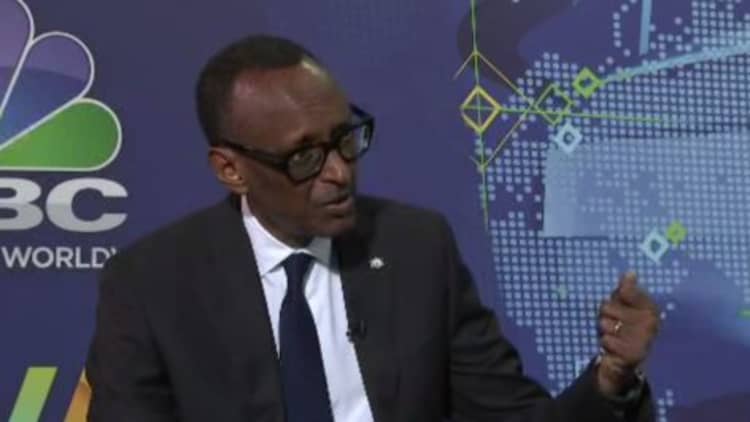African countries are making substantial progress in developing their financial markets on the back of new products, regulatory improvements and more responsive economic policy, according to new research from OMFIF (Official Monetary and Financial Institutions Forum).
The third iteration of the Absa Africa Financial Markets Index showed that 13 of 20 countries evaluated across the continent now score more than 50 out of 100 overall, compared to just three out of 20 in 2017. Botswana, Kenya and Namibia all joined these ranks over the 2018/19 financial year, indicating a quickening development of their respective capital markets.
Nations are measured on market depth, access to foreign exchange, market transparency, tax and regulatory environments, capacity of local investors, macroeconomic opportunity and adoption of international legal standards.
Jeff Gable, head of research at pan-African bank Absa, told reporters at a press briefing Monday that the index was beginning to foster a collaborative approach by policymakers across listed countries. The overall average score across all 20 nations climbed to 52.7 from 49.6 in 2017, with countries performing strongest on average in the 'market transparency, tax and regulatory environment' category.
"We're starting to see those countries use it as a tool to have discussions within the country - the regulators, discussions with the index fund managers, politicians and so on — and between countries," Gable said, adding that the goal of the index was to move away from the "traditional experience" of African nations looking outside the continent for economic and market guidance.
"Singapore's financial markets developed in this way, what should that tell me about how my financial markets develop in Botswana? That's not always obvious, but Botswana might be able to learn from South Africa, South Africa can learn from Kenya, Kenya can learn from Ghana," he said.
Executive Director of the Angola Securities Exchange, Akiules Neto, agreed, adding in a statement that the index had "helped our country design its reform plans with a view to promoting macroeconomic stability."
In terms of strong individual performances in the 2019 report, Egypt surpassed South Africa for the first time to record the highest score in 'macroeconomic opportunity'. This was driven by steady economic and export growth along with a decline in non-performing loans and strong reporting transparency, following Cairo's completion of the IMF reform program.
South Africa retained the overall top spot due to its market depth and availability of domestic capital.
Capturing capital
Gable said African nations were missing out on a real opportunity to attract capital from overseas investors.
"Right now, it's embarrassing for all of us in Africa to hear these stories of trillions in euros and pounds and dollars that are invested in negative-yields," he said.
"It's also about recognizing that there are savings to be put to work on the continent and often those savings don't find it very easy to make their way into the formal system, or worse, they bypass African systems and wealthy savers on the continent buy Gilts, Bunds, U.S. Treasurys. That's astonishing given the needs that we have for savings and what we think are the investable opportunities on the continent."
Despite ranking near the bottom of the index at present because its capital markets are in a very early stage of development, Absa and OMFIF researchers expect Ethiopia to make significant progress following the announcement of plans to launch a stock exchange by 2020. The east African nation is experiencing rapid economic growth but is still lacking in financial markets infrastructure.
Signs of progress
Africa has seen a slew of similar landmark market developments and policy changes over the past 18 months as countries seek to boost the growth of their financial markets.
"Nigeria recently issued its first 30-year bond, extending the yield curve out significantly, which was four times oversubscribed. We've seen Namibia launch its first green bond, we've seen Seychelles launch its first blue bond for the protection of the ocean environment," Gable said.
Elsewhere, Angola is expecting its first IPO in the coming months following the privatization of multiple state-owned enterprises. Mauritius launched an electronic government bond trading system, the Ivory Coast is developing an agricultural commodities exchange, Cameroon's Douala Stock Exchange merged with regional stock market Bourse des Valeurs Mobilières to l'Afrique Centrale, and the Dar es Salaam Stock Exchange became a full member of the World Federation of Exchanges.

On the policy front, Rwanda's central bank shifted to targeting inflation between 2% and 8% through interest rates rather than managing money supply, Egypt proposed a 10 times increase to banks' minimum capital requirements, and the Bank of Ghana released Interbank Forex Market Conduct Rules to regulate and improve trading practices.
The inaugural index in 2017 highlighted the pitfalls of rigid foreign exchange regimes, which handicapped investors and constrained countries' ability to handle global developments, and many countries evaluated have moved to more flexible rates with greater shock absorption.
"There has been a concerted effort among African policymakers to react to the findings," said George Asante, head of global markets for Absa's regional operations.
"The index is becoming a powerful barometer for policymakers and playing a role in building an Africa which is able to fund itself."

